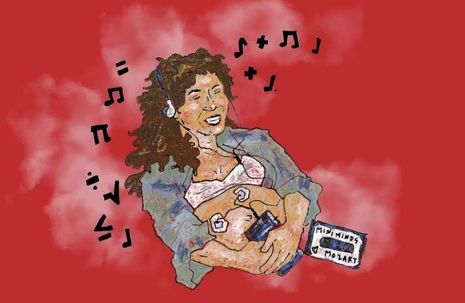Unravelling the myth of the Mozart effect
Isabel Lee seperates fact from fiction in the link between music and the mind

Did you know that Albert Einstein, one of the smartest men in history, was also a violinist? He loved playing Mozart and Bach, often improvising on the violin as a way to clear his mind and work through complex problems. This fascination with Mozart as a catalyst for intelligence has spilled into modern life. What parent wouldn’t want to give their child an edge in cognitive performance? This desire has fuelled a multibillion-dollar industry, offering products aimed at enhancing mental functions for children and expectant mothers.
“My parents undoubtedly believed in the magic of Mozart’s music”
Music fits perfectly into our preference for enjoyable activities that don’t feel like work. Just pop in a CD or turn on your MP3 player, and you’re set for an effortless listening experience. This simple appeal has led to a rise in the popularity of albums like Mozart for the Mind and Mozart Effects for Mums and Mums-To-Be. Some products even feature a device that allows mothers to place speakers directly on the abdomen, claiming to play music directly to the womb. My parents undoubtedly believed in the magic of Mozart’s music, as they often played Mozart for Babies while I slept as a child. These products claim to invigorate brain growth before birth, and even positively impact emotional perceptions and attitudes, but do they have any scientific support? If Mozart’s music makes us smarter, why is it specifically his that is deemed beneficial?
The “Mozart Effect” gained traction in the early 1990s, fuelled by Governor Zell Miller’s call in the United States to provide every newborn with a CD of Mozart’s music, reinforcing the belief that listening to Mozart could not only enhance cognitive abilities in children but could also stimulate brain development even before birth.
Rauscher and several researchers were the first to propose the concept of the “Mozart Effect”. In a 1993 study, a group of college students completed a set of spatial reasoning tasks after listening to either an excerpt of Mozart’s sonatas, relaxation tapes, or sitting in silence. Those who listened to Mozart performed better, suggesting that Mozart’s music might temporarily enhance one’s spatial abilities. These intriguing results led to a widespread belief that classical music is key for boosting brainpower, particularly for newborns. However, it remains unclear whether the genius of Mozart was specifically communicated through listeners’ brains, leading to improved cognitive performance, or whether it’s music in general that has that effect.
“It remains unclear whether the genius of Mozart was specifically communicated through listeners’ brains”
While researching the effect of music on brainpower, scientists at the time also found that music can elevate mood and arousal. According to neuroscientist Jessica Grahn, our performance on certain tasks improves due to the elevated mood and arousal induced by music. When we listen to music, our brains release neurotransmitters like dopamine, which are associated with pleasure and reward. With Grahn’s theory, when we feel good, we are more likely to concentrate and engage more effectively with tasks. This finding shifts the focus from Mozart’s brilliance to the broader emotional and cognitive benefits of music itself.
Though there is no direct correlation between Mozart’s music and an improvement in one’s cognitive abilities, research suggests specific benefits for individuals with epilepsy. Recent studies show that Mozart’s music can lead to significant reductions in epileptiform activity in patients experiencing seizures. Other genres, like minimalist music from Philip Glass, do not produce the same benefits for spatial-temporal or seizure activity. It was discovered that much of Mozart’s music, along with works by J.S. Bach, exhibits a high degree of long-term periodicity, particularly within the ten to 60-second range. This refers to the patterns that repeat in regular cycles in a piece of music. By contrast, Glass’ music showed little long-term periodicity. Thus, it seems to be music with long-term periodicity (common in Mozart and Bach) that resonates with the brain, decreasing seizure activity and improve spatial reasoning.
“Any music you enjoy can do wonders for your brain”
So, does the Mozart effect exist? Should mothers still play Mozart for their babies? While the original positive findings by Rauscher in the 1990s sparked widespread interest, many scientists now argue that any benefits from Mozart’s music stem more from the enjoyment and arousal it creates rather than a direct boost in brainpower. In other words, while Mozart might be great, it turns out that any music you enjoy can do wonders for your brain! There is also scientific evidence suggesting that music has long-term, direct effects on brain development. Studies show early musical training can lead to significant structural changes in the brain, enhancing motor and auditory skills. Plus, the hippocampus – the brain region involved in memory and spatial navigation – also increases neuronal connections during a child’s involvement in musical training.
Whether or not Mozart’s music specifically makes us smarter, there’s no denying that music brings some serious benefits to our brains and moods. So whether it’s Mozart or your favourite pop tune, cranking up the music is a great way to boost your intelligence and enjoy life. Engaging with music isn’t just about boosting intelligence; it also reshapes our brain, fostering emotions, both joy and sorrow, allowing us to connect more intimately with ourselves and others through shared experiences.
 News / Deborah Prentice overtaken as highest-paid Russell Group VC2 February 2026
News / Deborah Prentice overtaken as highest-paid Russell Group VC2 February 2026 News / Christ’s announces toned-down ‘soirée’ in place of May Ball3 February 2026
News / Christ’s announces toned-down ‘soirée’ in place of May Ball3 February 2026 Fashion / A guide to Cambridge’s second-hand scene2 February 2026
Fashion / A guide to Cambridge’s second-hand scene2 February 2026 News / Downing Bar dodges college takeover31 January 2026
News / Downing Bar dodges college takeover31 January 2026 Comment / Men at Cambridge are experiencing equality2 February 2026
Comment / Men at Cambridge are experiencing equality2 February 2026










